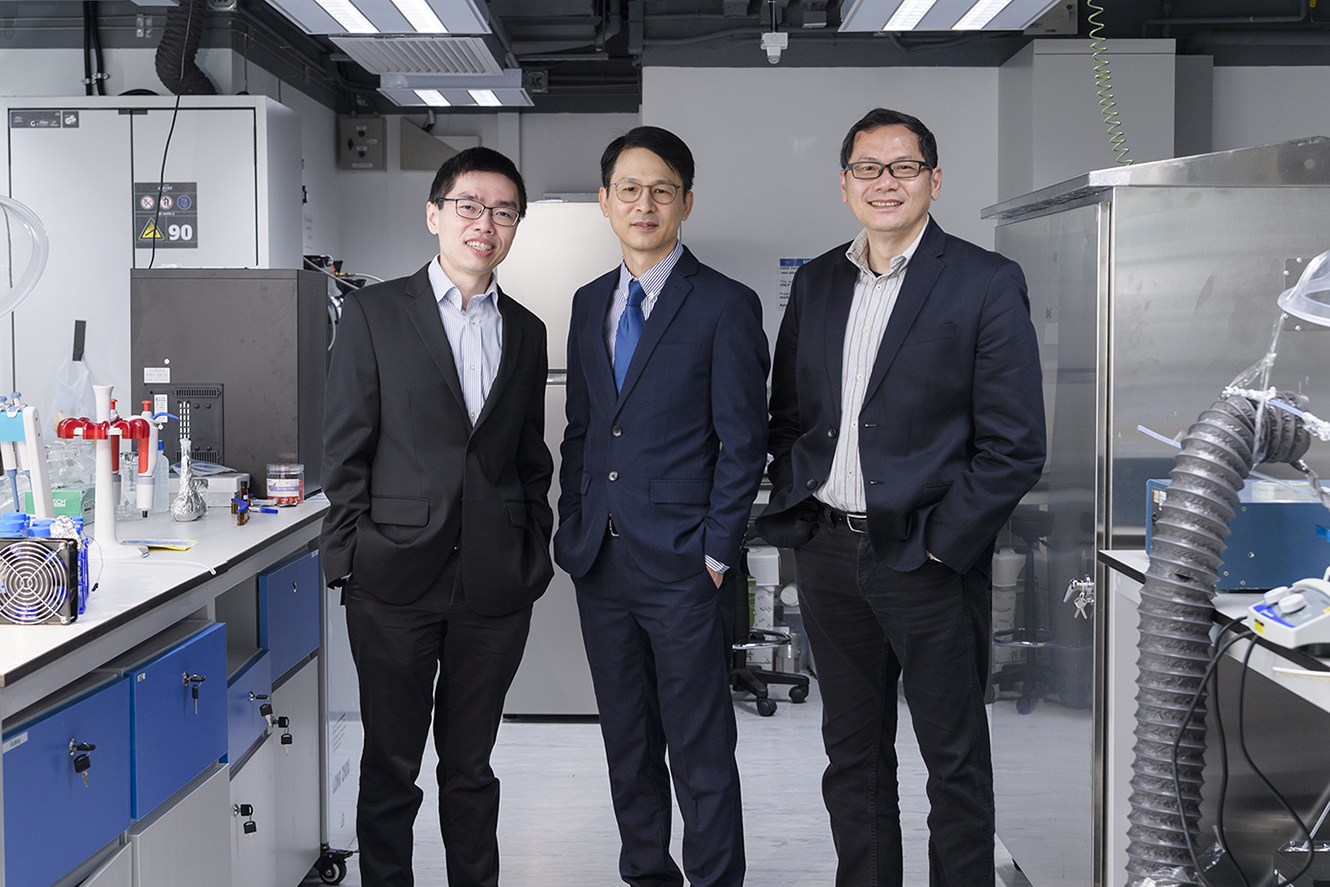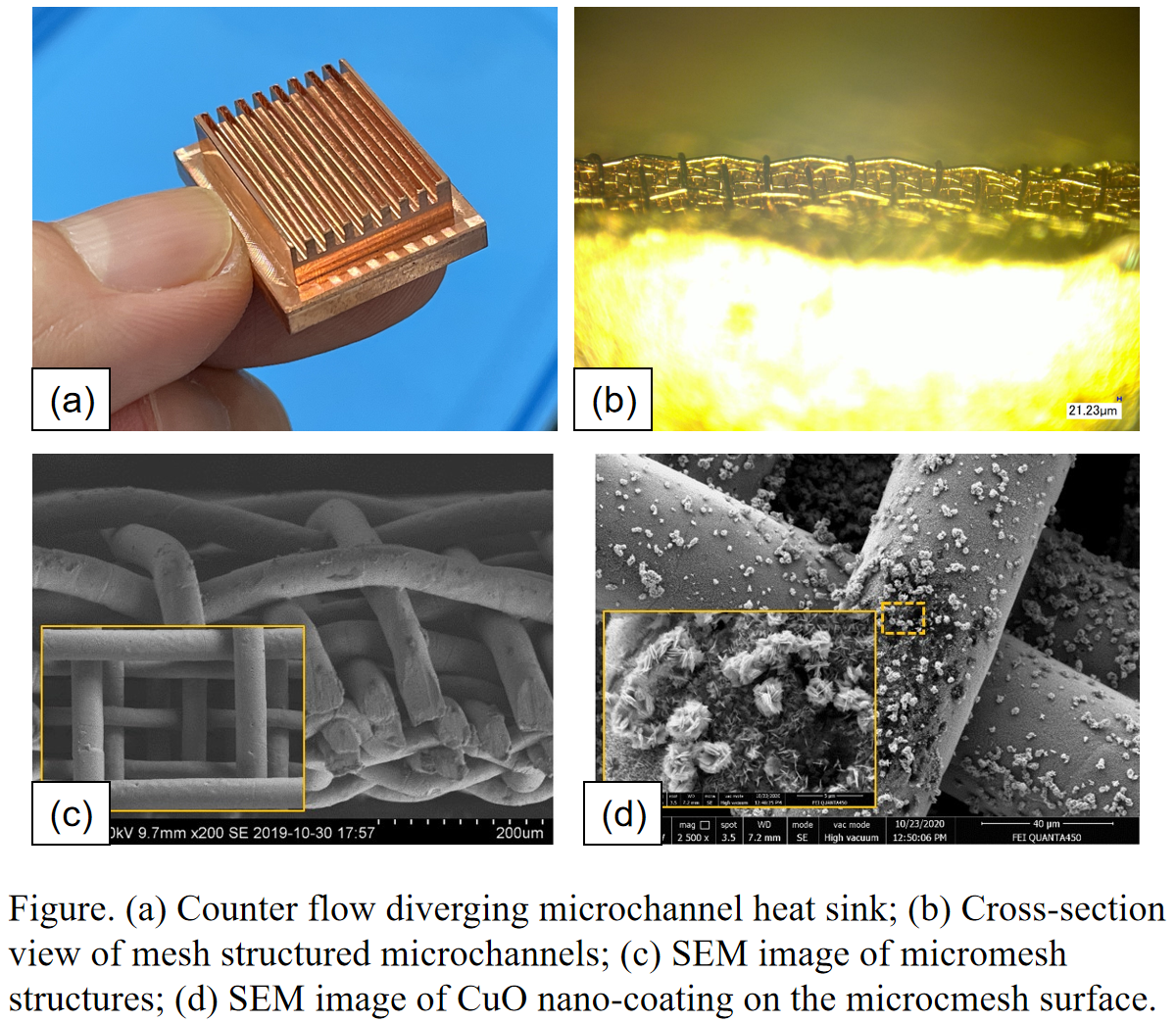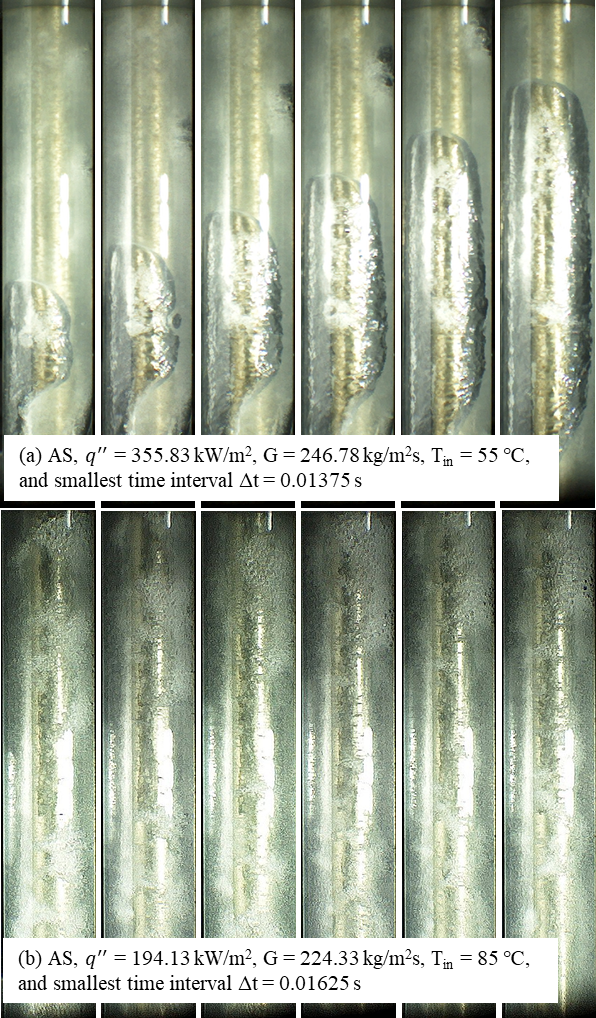Projects

Rapid Detection and Synergetic Disinfection of Bioaerosols Using Far UVC and Negative Air Ions: Mechanistic and Field Studies
Principal Investigator: Prof. CHi Keung Alvin LAI
Research Impact Fund
Funding: HK$6,150,000

High Performance Microchannel Heat Sink with Hybrid Micro/Nano Structured Mesh
Principal Investigator: Prof. Chin PAN
General Research Fund
Funding: HK$917,695
Energy-saving and reliable cooling systems are urgently needed for the flourishing electronic industry demanding a very high heat dissipation rate. Through the channel-to-channel heat exchange, a counter flow diverging microchannel heat sink has demonstrated to be a high-performance cooling design, i.e., very high cooling rate per unit area with remarkably low two-phase flow pressure drop in our series of studies. This research work further investigate liquid film evaporation in microchannel with surface modification of microscale meshes and nanoscale coating structures. The present study may bring a significant enhancement on phase-change heat transfer performance with highly efficient liquid replenishment from the excellent wicking effect of nano-structure and become another high performance cooling devise.

Investigations of Two-phase Natural Circulation Loop with Artificial Seawater
Principal Investigator: Prof. Chin PAN
General Research Fund
Funding: HK$856,381
Nuclear power, with zero direct emissions during operation, is a very effective option for carbon neutrality in 2050-2060. The nuclear safety can be significantly enhanced if a passive heat removal system is adopted and seawater can be used as an alternative emergency coolant. In this project, we will develop a passive heat removal system with two-phase natural circulation loop using seawater as the working fluid. We will investigate related thermal hydraulic behaviors using seawater. Differences of boiling patterns between de-ionized water and seawater may significantly influence the pressure drop and two-phase natural circulation. The effect of inlet temperature on the performance of the system and the nature of instabilities using seawater will be examined.
An Upcycling Solution to the Paradox of Clean Energy Development
Principal Investigator: Prof. LIEW Kim-meow
Collaborative Research Fund
Funding: HK$5,420,773
The project will upcycle waste glass and recycled carbon fibers from end-of-life solar panels and wind turbine blades by using these materials as key components of fiber-reinforced alkali-activated cement composites (FRAC). This process will consist of five major tasks: (1) devise a process control strategy to recycle glass and carbon fibers from end-of-life solar panels and wind turbine blades; (2) develop a body of knowledge on the design, mechanisms, and characterization of waste derived FRAC; (3) evaluate strength development of FRAC and optimize their mechanical performance; (4) examine the long-term durability and leachability of FRAC; and (5) assess their environmental and economic impacts. This proposed project will advance the scientific frontiers of waste upcycling by developing an innovative method for transforming waste into valuable and eco-friendly construction materials. This will also help Hong Kong to achieve its sustainable development goals, thereby supporting the Climate Action Plan 2030+.
Subambient Daytime Radiative Cooling Coating for Energy-Efficient Building Envelope
Principal Investigator: Prof. DAI Jianguo
Collaborative Research Fund
Funding: HK$5,384,413
Buildings are responsible for about 90% of the total electricity consumption and approximately 60% of the total carbon dioxide emissions in Hong Kong. Building envelope plays a vital role in the thermal performance of buildings since it is in contact with the external environment that produces great temperature fluctuations and affects the thermal comfort of indoor space. Protective surface coatings are widely used on building envelopes to shield the structures from environmental weathering and to improve their durability and extend their service life. Recently, daytime passive radiative cooling technology has attracted significant attention as a means of energy conservation for building envelopes and represents revolutionary progress to upgrade traditional building coatings. This project aims to develop an innovative category of multi-functional white and colored passive radiative cooling coatings (RCCs) for building roof/wall applications and a smart transparent radiative cooling coating material for window use. The RCCs will be made from inorganic geopolymer, a clinker-free, and low carbon cementitious binder, and imbued with sub-ambient daytime radiative cooling capacity. On the other hand, the smart transparent RCC will be made with double-layer nanophotonic coatings whose properties are temperature-adaptive. The long-term bonding performance of the developed RCCs on different substrate materials and their weathering resistance will be carefully examined. Energy savings from applying these RCCs on building envelopes in relation to different building characteristics and climatic conditions will be determined by combined experimental study and numerical simulation. This research topic is multi-disciplinary and also interdisciplinary, requiring collaborative expertise from civil engineering, nano-optics and optical metamaterials, building energy, and materials science & engineering disciplines, and producing new insights and solutions for tackling the urgent building energy-saving problem highly relevant to Hong Kong and other densely populated subtropical cities. This project will contribute significantly to the net-zero-emission goal set by Hong Kong and the nation.
Development of an Aero E-Bike Integrated with A High-Performance, Highly-Stable and Long-Life Battery Pack
Principal Investigator: Prof. Steven Wang
Innovation and Technology Fund
Funding: HK$6,180,660.77

Tomorrow is Now: Eco-friendly Autonomous Construction through Sustainable 3D Concrete Printing
Principal Investigator: Prof. LIEW Kim-meow
Strategic Topics Grant
Funding: HK$33,333,000
In Hong Kong, there is an ongoing need for construction to address the local housing crisis, as well as a lack of land for landfill development. Imminent shortages in resources and skilled labor compound these issues. Therefore, this proposed Strategic Topic project aims to develop an innovative system to construct buildings autonomously and sustainably through three-dimensional concrete printing (3DCP) with minimal interaction from a non-specialist operator. The system will reduce labor needs for the construction sector, while improving quality assurance and control, minimizing waste of materials and time, and providing a route for large-scale industrial recycling. Additionally, 3DCP excels in generating intricate shapes and structures that are unattainable through conventional construction techniques, increasing capabilities for on-site and off-site construction. This collaborative project will integrate team knowledge from multiple disciplines (materials science, computational modeling, artificial intelligence, system design, automation and control, digital twins, environmental science and public policy) to develop this automatic and sustainable system. First, we will use generative artificial intelligence techniques to develop sustainable cementitious composites that include waste-derived components. Second, using computational simulations and laboratory-scale prototypes, we will optimize the developed cement composites for use in 3DCP. Third, we will design a cable-driven robot system for 3DCP with newly proposed control algorithms for automatic, reliable, and high-quality printing processes. Fourth, we will develop an automated 3DCP control system with real-time monitoring and feedback, as well as digital twins of the 3DCP system that can interact with computational models. Finally, we will assess the social, economic, and environmental factors that may affect the sustainable implementation of the developed system by the construction industry in Hong Kong. The overall objective of this proposed project is to furnish the construction sector in Hong Kong with a complete system of automated, robust, and cost-effective 3DCP technology that uses sustainable building materials and produces minimal waste. This project will contribute to alleviating housing and labor shortage, saving landfill space, and reducing carbon emissions, in Hong Kong, the Greater Bay Area (GBA), and internationally.
Integrating Materials, Behavior, Robotics and Architecture in Giant Filter-feeding Sharks
Principal Investigator: Prof. Mason Dean
Human Frontier Science Program
Funding: HK$9,400,000
The largest animals of the past and present are suspension feeders, surviving by filtering and eating huge quantities of some of the smallest food in the ocean. This strategy has evolved repeatedly in a wide diversity of animals--from sponges to mammals--and is thought to be the most efficient feeding option for supporting the body mass of ocean giants like whales and the largest sharks. Despite the charisma and protected status of many large-bodied suspension feeders, we know surprisingly little about their ecologies and the tools they use to process water on industrial scales. This is largely due to challenges of studying these animals and their filters in the wild. We integrate a variety of disciplines and scales in the study of suspension feeding in the basking shark, a cosmopolitan species and the second largest fish, reaping greater than 30 kg of plankton per day. We will use animal-borne tag sensors, drones and swarms of underwater robots to capture and dissect basking shark feeding events, to quantify the mechanics, behavior, and hydrodynamics of foraging. These data will be integrated with morphological and anatomical investigations of basking sharks' fundamental filtering tools--stiff bristles called gill rakers, lining the throat by the tens of thousands--using advanced bioimaging and engineering techniques to quantify their geometries and materials. Behavioral and material data will converge in multi-scale optimization models of flow and filtration, in digital simulations and performance tests of 3D printed biomimics, building from fine-scale biological architectures to explore hypothetical shapes and arrangements, using machine learning to integrate model predictions from micron to meter scales. Seeing a high-performance biological system through the lenses of materials science, animal behavior, robotics and architecture, we gain a unique mechanistic window into the interaction of basking sharks with their environment, and the tools and energetics of a specialized ecology that has existed for millions of years. Exploiting this intersection of disciplines, we will learn how mineralized materials can be modified into high-throughput filters; create new integrated approaches and tools to characterize complex bio-architectures and monitor large aquatic animals in their habitats; and gain bioinspiration for new filter design in a wide range of applications.